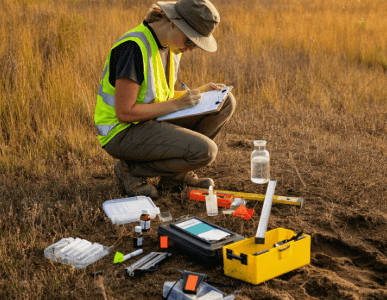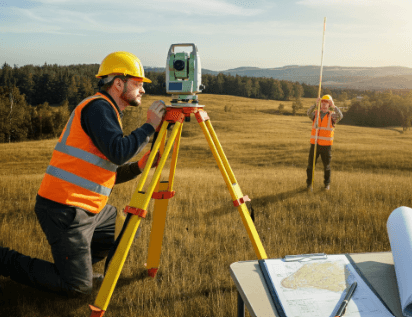Embarking on a construction project in Florida necessitates a thorough understanding of the process of land preparation for building. This crucial phase lays the groundwork—quite literally—for the successful execution of any building endeavor, ensuring that the land is assessed correctly, cleared, and primed for development. From soil testing and site surveying to clearing vegetation and creating drainage solutions, the process of land preparation for building in Florida is an essential step that can determine the longevity and stability of the future structure. Read on as we delve into the key stages of land preparation, emphasizing best practices specific to Florida’s unique landscape and regulatory environment.
Steve Daria and Joleigh, both seasoned real estate investors, emphasize the importance of meticulous land preparation when embarking on new projects in Florida. Their combined experience highlights the need for proper soil testing and site surveying to avoid future complications. Additionally, they advocate for thoroughly clearing vegetation and creating effective drainage solutions to adapt to Florida’s unique climate and regulatory requirements.
Understanding the Process of Land Preparation for Building in Florida
Land preparation is a critical initial phase in any construction project, involving systematic steps to transform raw land into a suitable site for building.
The process begins with a thorough assessment of the land’s topography, soil composition, and drainage characteristics.
Soil testing is often conducted to determine its bearing capacity and suitability for supporting structures.

Why is Land Preparation Important?
Proper land preparation is essential for several reasons:
- It ensures the stability and security of the structure.
- It helps prevent future issues such as flooding or erosion.
- It enhances the value of the property.
The Unique Challenges of Florida
Florida’s distinct environmental factors pose significant challenges during land preparation for construction projects.
The state’s tropical climate, characterized by high humidity and frequent rainfall, affects soil conditions and compaction rates, requiring careful consideration during site preparation.
The sandy soil prevalent in many parts of Florida necessitates special attention to soil stabilization techniques to ensure adequate foundation support.
Get Started: Get Your Cash Offer Below…
We are direct land buyers. There are no commissions or fees and no obligation whatsoever. Start below by sharing where your property is and where we can send your offer…
Evaluating the Land
The process of land preparation for building comes with evaluating the land.
Conducting a Land Survey
A land survey provides detailed information about the boundaries, elevation, and existing structures on the land.
This step is important to avoid legal disputes and ensure compliance with local regulations.
Soil Testing and Analysis
Florida’s diverse soil types require thorough testing to determine suitability for building.
Soil analysis can reveal issues such as:
- Poor drainage
- High water table
- Soil stability
Environmental Impact Assessment
Conducting an environmental impact assessment ensures that your project complies with Florida’s environmental regulations.
This assessment evaluates potential impacts on local wildlife, water sources, and vegetation.
Clearing and Grading the Land
Clearing and grading the land are essential steps in the process of land preparation for building in Florida.
Removing Vegetation and Debris
Clearing the land involves removing trees, shrubs, and debris.
This step prepares the site for grading and excavation.
Grading for Proper Drainage
Land grading ensures proper drainage, which is crucial in Florida’s wet climate.
Proper grading stops water from pooling around the foundation, reducing the risk of flooding.
Excavation and Foundation Preparation
Excavation involves digging trenches for the foundation.
This step must be done carefully to ensure the stability and integrity of the building.
Addressing Water and Drainage Issues
Explore these essential steps when addressing water and drainage issues.
Installing Drainage Systems
Proper drainage systems are essential to manage Florida’s heavy rainfall.
These systems include:
- French drains
- Swales
- Retention ponds
Managing Flood Zones
Understanding flood zones and implementing appropriate measures can protect your property from water damage.
This may involve elevating the structure or installing flood barriers.
Permitting and Compliance
Permitting and compliance are necessary steps in the process of land preparation for building in Florida.
Obtaining Necessary Permits
Before starting any land preparation, it’s crucial to obtain the necessary permits from local authorities.
These permits guarantee your project’s adherence to zoning laws and environmental regulations while maintaining compliance.
Navigating Florida’s Building Codes
Florida has specific building codes that must be followed during land preparation and construction.
Familiarize yourself with these codes to avoid penalties and delays.
Working with Local Authorities
Collaborating with local authorities can streamline the permitting process and ensure compliance with all regulations.
Working with Professionals
Working with professionals is essential when planning to build.
Hiring a Land Surveyor
A professional land surveyor can provide accurate and detailed information about your property.
This information is essential for planning and executing the land preparation process.

Finding a Qualified Contractor
Hiring a qualified contractor with experience in Florida’s unique conditions is crucial.
Look for contractors with a proven history of successful projects in the area.
Consulting an Environmental Specialist
An environmental specialist can help you understand and mitigate the environmental impact of your project.
Their expertise ensures compliance with regulations and protects local ecosystems.
Sustainable Land Preparation Practices
Explore these essential tips for implementing sustainable land preparation practices.
Utilizing Green Building Techniques
Incorporating green building techniques during land preparation can reduce your environmental footprint.
These techniques include:
- Using sustainable materials
- Implementing energy-efficient systems
- Minimizing land disturbance
Protecting Local Wildlife and Vegetation
Preserving local wildlife and vegetation is essential for maintaining Florida’s natural beauty.
Implementing measures to protect these resources can enhance the value of your property.
Managing Waste and Recycling
Proper waste management and recycling during land preparation reduce environmental impact and promote sustainability.
Budgeting for Land Preparation
Dive into the budgeting tips for preparing your land for building.
Estimating Costs
Accurately estimating the costs of land preparation is crucial for budgeting.
Consider factors such as:
- Land survey fees
- Soil testing costs
- Clearing and grading expenses
Contingency Planning
Unexpected issues can arise during land preparation.
Having a contingency plan and budget can help you manage these challenges without derailing your project.
Financing Options
Explore various financing choices to fund your land preparation and construction project.
These options may include loans, grants, or private investors.
Conclusion
The proper process of land preparation for building is the foundation of a successful project in Florida. By knowing the unique challenges and following best practices, you can guarantee a smooth and efficient process. Whether you are a real estate investor, land buyer, seller, house buyer, or Florida resident, this comprehensive guide provides the awareness and strategies needed to prepare your land for building.
**NOTICE: Please note that the content presented in this post is intended solely for informational and educational purposes. It should not be construed as legal or financial advice or relied upon as a replacement for consultation with a qualified attorney or CPA. For specific guidance on legal or financial matters, readers are encouraged to seek professional assistance from an attorney, CPA, or other appropriate professional regarding the subject matter.
